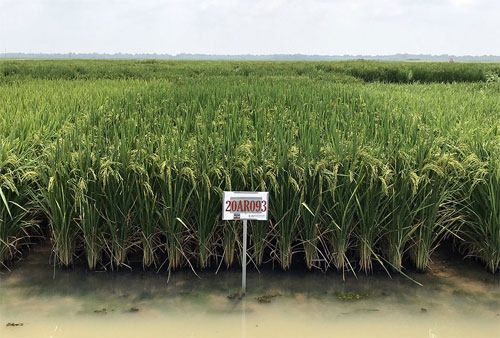Fayetteville, Arkansas, USA
January 31, 2022

CLL18, a new long-grain Clearfield variety, heads out in a research plot at the Rice Research and Extension Center near Stuttgart. The sign identifies the variety's breeding designation before the Arkansas Agricultural Experiment Station released it in 2022. (U of A System Division of Agriculture photo by Christian DeGuzman)
- Arkansas Agricultural Experiment Station releases high-yielding Clearfield® variety
- CLL18 yielded 221 bushels per acre in Arkansas Rice Performance Tests
- Seed will be available from BASF Agricultural Solutions through Horizon Ag in 2023
CLL18, a new high-yielding, Clearfield® rice variety developed by the Arkansas Agricultural Experiment Station will be available to rice growers from Horizon Ag in 2023.
The new rice is called CLL18 and averaged 221 bushels per acre over two years in the 2020-21 Arkansas Rice Performance Trials conducted by the University of Arkansas System Division of Agriculture.
Beginning in 2022, the ARPT will be known as the Arkansas Rice Variety Advancement Trials.
“This was the highest yielding nonhybrid Clearfield® rice in the ARPT for those two years,” said Karen Moldenhauer, professor emeritus and rice breeder for the experiment station. “It has looked very good in all of the tests it has been in.
“CLL18 is an excellent long-grain Clearfield® line derived from the cross of Roy J and CL142-AR, made at the Rice Research and Extension Center at Stuttgart in 2011,” Moldenhauer said.
BASF provided the CL142-AR Clearfield® breeding material.
“It has excellent rough rice yields,” Moldenhauer said. “CLL18 yielded a two-year mean of 221 bushels per acre in the 2020-21 ARPT, compared to CLL16 at 210 bushels per acre and Diamond at 209 bushels per acre,” she said.
“BASF views CLL18 as a high performing new Clearfield® variety that will greatly benefit Arkansas rice growers, as well as rice growers in the mid-south down to the coastal states,” said Frank Hardimon, rice licensing account manager for BASF Agricultural Solutions. “The New CLL18 will be a great addition to the Horizon Ag portfolio of herbicide-tolerant rice varieties. CLL18 will be an excellent companion to CLL16, this combination of broadly adapted varieties will have strong performance across the mid-south.”
“We appreciate the rice breeding efforts of the University of Arkansas System Division of Agriculture that developed CLL18 and the business relationship that we have with Horizon Ag that will bring CLL18 to the market in 2023,” Hardimon said.
Tim Walker, Horizon Ag general manager, said, “We’re excited about the fit that new CLL18 will have in our elite Clearfield® rice variety portfolio and the outstanding performance potential it offers our farmers. CLL18 has shown it has yield potential equal to or greater than CLL16, which has proven it can yield with or better than top-performing varietals and even hybrids. In addition, because CLL18 is earlier in maturity than CLL16 and appears to be well adapted to the coastal region of Louisiana and Texas, it may have a better fit in second crop situations.”
CLL18 will be in seed production in 2022, Walker said. He encourages farmers to look at how it performs and where it will fit on their farms, along with other Horizon Ag Clearfield® performers like CLL16, CLL15 and CLL17.
“CLL18 is another step in our commitment to providing farmers better and better-performing varieties,” Walker said. “Since it doesn’t have the pi-ta gene, it doesn’t have as broad a spectrum for blast as CLL16. But it will be a great addition to the top-performing Clearfield® varieties that are helping farmers improve production potential and profitability.”
Moldenhauer said CLL18 has a plant height of 37 inches with grain weight and kernel size like Diamond, and early maturity similar to CLL15. It has a lodging resistance similar to Diamond and CLL16.
“CLL18 is moderately susceptible to common rice blast, to sheath blight, bacterial panicle blight and false smut,” Moldenhauer said. “It is moderately resistant to narrow brown leaf spot.”
CLL18 has typical southern U.S. long-grain cooking quality, she said.
Clearfield® rice, from which CLL18 was bred, was developed at Louisiana State University from a rice breeding line with a naturally occurring genetic mutation tolerant to the imidazoline family of herbicides.
Scientists at LSU licensed the original Clearfield® lines to American Cyanamid, now BASF Agricultural Solutions, which later shared the breeding material with the University of Arkansas System Division of Agriculture. Horizon Ag is a seed technology company licensed by BASF to market Clearfield® rice varieties.
Breeder seed for CLL18 will be maintained at the Division of Agriculture’s Rice Research and Extension Center and distributed to growers by Horizon Ag.
Fertilizer and other agricultural management recommendations are available from County Extension offices or Horizon Ag.
To learn more about Division of Agriculture research, visit the Arkansas Agricultural Experiment Station website: https://aaes.uada.edu/. Follow us on Twitter at @ArkAgResearch. To learn about Extension Programs in Arkansas, contact your local Cooperative Extension Service agent or visit https://uaex.uada.edu/. Follow us on Twitter at @AR_Extension.
To learn more about the Division of Agriculture, visit https://uada.edu/. Follow us on Twitter at @AgInArk.